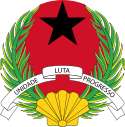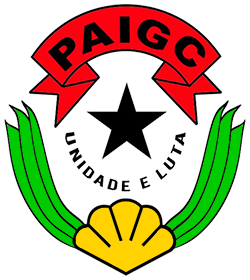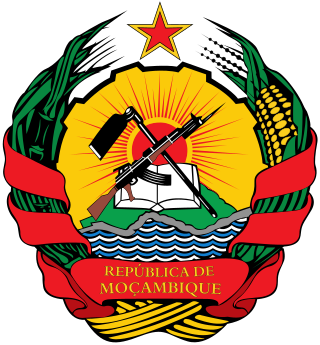 |
|---|
Elections to the Legislative Assembly were held for the first and only time in Portuguese Guinea in March 1973.
 |
|---|
Elections to the Legislative Assembly were held for the first and only time in Portuguese Guinea in March 1973.
A fifteen-member Legislative Council had been established in Portuguese Guinea in 1963. Most members were nominated by colonial authorities or business groups. A minority of its members were elected, but only a small proportion of the colony's population met the literacy and tax-paying requirements to register as a voter. [1]
On 2 May 1972 the Portuguese National Assembly passed the Organic Law for the Overseas Territories, which provided for greater autonomy for overseas territories. [2] The Legislative Council was converted into a Legislative Assembly, with number of members increased to 17, of which five were to be elected by direct suffrage. [2]
In late 1972 the African Party for the Independence of Guinea and Cape Verde (PAIGC) held indirect elections to a National Assembly in the eleven regions of the territory that it controlled, with voting not taking place in the four still controlled by Portuguese forces.
Due to the restrictive conditions on registering to vote and more than half the country being under the control of the PAIGC, there were only 7,824 registered voters, less than 3% of the adult population. [1]
The elections were carried out on a non-party basis, [3] with 6,995 people casting votes, giving a voter turnout of 89.4%. [4]

The African Party for the Independence of Guinea and Cape Verde is a political party in Guinea-Bissau. Originally formed to peacefully campaign for independence from Portugal, the party turned to armed conflict in the 1960s and was one of the belligerents in the Guinea-Bissau War of Independence. Towards the end of the war, the party established a socialist one-party state, which remained intact until multi-party democracy was introduced in the early 1990s. Although the party won the first multi-party elections in 1994, it was removed from power in the 1999–2000 elections. However, it returned to office after winning parliamentary elections in 2004 and presidential elections in 2005, since which it has remained the largest party in the National People's Assembly.

João Bernardo "Nino" Vieira was a Bissau-Guinean politician who served as President of Guinea-Bissau from 1980 to 1999, except for a three-day period in May 1984, and from 2005 until his assassination in 2009.

France is a unitary semi-presidential republic with a bicameral legislature. Public officials in the legislative and executive branches are either elected by the citizens or appointed by elected officials. Referenda may also be called to consult the French citizenry directly on a particular question, especially one which concerns amendment to the Constitution.

Elections in Angola take place within the framework of a multi-party democracy. The National Assembly is directly elected by voters, while the leader of the party or coalition with the most seats in the National Assembly automatically becomes President.

The African Party of Independence of Cape Verde is a democratic socialist political party in Cape Verde. It was the sole legal party in the country from 1981 to 1990. Its members are nicknamed "os tambarinas" in Portuguese, and they identify themselves with the color yellow.

The Guinea-Bissau War of Independence, also known as the Bissau-Guinean War of Independence, was an armed independence conflict that took place in Portuguese Guinea from 1963 to 1974. It was fought between Portugal and the African Party for the Independence of Guinea and Cape Verde, an armed independence movement backed by Cuba, the Soviet Union, Yugoslavia and Brazil. The war is commonly referred to as "Portugal's Vietnam" because it was a protracted guerrilla war which had extremely high costs in men and material and which created significant internal political turmoil in Portugal.

Elections in Guinea-Bissau take place within the framework of a multi-party democracy and a semi-presidential system. Both the President and the National People's Assembly are directly elected by voters.

The National Assembly is the unicameral legislative body of the Republic of Cabo Verde.

Parliamentary elections were held in Guinea-Bissau on 16 November 2008. The result was a victory for the African Party for the Independence of Guinea and Cape Verde (PAIGC), which won 67 out of the 100 seats in the National People's Assembly, while the Party for Social Renewal (PRS) won 28 seats.

Raimundo Rodrigues Pereira is a Bissau-Guinean lawyer and politician who was interim President of Guinea-Bissau from 3 March 2009 to 8 September 2009 and again in 2012, following the departure of President Malam Bacai Sanhá for medical treatment abroad; he continued in that capacity after Sanha's death. Pereira was elected as President of the National People's Assembly on 22 December 2008. Pereira is a member of the African Party for the Independence of Guinea and Cape Verde (PAIGC). He was ousted in a coup on 12 April 2012 and succeeded by Mamadu Ture Kuruma.

Parliamentary elections were held in Portugal on 28 October 1973. After the only opposition party withdrew from the election, the People's National Action (ANP) was the only list to contest the election, winning all 150 seats. The 1973 election would be the last held under the Estado Novo, as five months later, the Carnation Revolution would bring down the regime. In 1975, the Constituent Assembly of Portugal was elected in the first democratic elections since 1925.

Indirect parliamentary elections were held in Guinea-Bissau between 19 December 1976 and mid-January 1977, the first since independence from Portugal. At the time, the country was a one-party state with the African Party for the Independence of Guinea and Cape Verde (PAIGC) as the sole legal party. A single, official list of PAIGC candidates was presented to voters, although in some areas people voted for unofficial candidates, who achieved almost 20% of the national vote. The Assembly elected Luís Cabral to the post of President on 13 March 1977.

Indirect elections to a National Assembly were held in the parts of Portuguese Guinea held by the rebel African Party for the Independence of Guinea and Cape Verde (PAIGC) between August and October 1972, but not in the Portuguese-controlled areas of Bissau, Bolama, the Bissagos Islands and Bafatá.

The Coloured vote constitutional crisis, also known as the Coloured vote case, was a constitutional crisis that occurred in the Union of South Africa during the 1950s as the result of an attempt by the Nationalist government to remove coloured voters in the Union's Cape Province from the common voters' rolls. It developed into a dispute between the judiciary and the other branches of government over the power of Parliament to amend an entrenched clause in the South Africa Act and the power of the Appellate Division to overturn the amendment as unconstitutional. The crisis ended when the government enlarged the Senate and altered its method of election, allowing the amendment to be successfully enacted.

Elections to a Legislative Assembly were held for the first and only time in Portuguese Mozambique in March 1973.

Elections to a Legislative Assembly were held for the first and only time in Portuguese Angola between 19 and 27 March 1973.

Elections to a Legislative Assembly were held for the first and only time in Portuguese Cape Verde in March 1973.

Elections to a Legislative Assembly were held for the first and only time in Portuguese São Tomé and Príncipe in March 1973.

Elections to a Legislative Assembly were held for the first and only time in Portuguese Timor in March 1973.
Elections to a Legislative Assembly were held in Macau in March 1973.